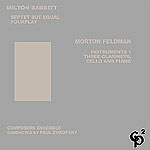
I should first confess to never having been able to derive much pleasure from Milton Babbittís music. It had been quite a while since I had seriously listened to any, however, and I thought that, perhaps with age and maturity, Iíd be ready to hear what Iíd been missing. Well, yes and no. The two Babbitt compositions heard here (all lovingly performed by the Composers Ensemble under the direction of Paul Zukofsky) are relatively late ones (1992 and 1984) and find him positively wallowing in the expressive use of aural colors. Septet But Equal (Babbittís weakly punning titles donít get him very far with me) is scored for three clarinets (one doubling bass clarinet), piano and string trio, and the composer goes out of his way to discover unusual and lush harmonies. Structurally, however, one hears just so many colorful strands looping and twirling about each other to no particular effect. The overriding impression is of a gifted speaker who manipulates words wonderfully but after having been dazzled with glossolalia for some 26 minutes, you retroactively realize he hasnít actually said much of anything. The air he breathes in and out is ... musty. Fourplay, despite sounding like the title of some late night cable offering, is less sexy than that, a work for clarinet, cello, violin and piano thatís not awfully dissimilar from the prior piece. Once again, the arrangement is lavish, the pure sounds produced quite attractive. Itís not that the structure is random in an interestingly modern manner, itís that it straddles contemporary and classic forms, settling on neither and ending up evoking indecisiveness rather than inclusion.
But then, very happily, someone throws a large window open, allowing a surge of fresh, crisp air into the room. Morton Feldmanís music simply occupies another space, refers to an entirely different way of looking at and living in the world. The two compositions here are from his middle-late period (1974 and 1971), those years where he was delicately balanced between the earlier, more severe works and the later, rapturously languorous ones. Instruments I is scored for a typically Feldman-esque ensemble: alto flute, oboe, trombone, celesta and percussion, and whereas he is ever bit the gorgeous colorist that Babbitt is, Feldman adds so much more. From note one, thereís not a wasted breath, an unnecessary aside, a verbose expostulation. With an utterly unique and exquisite sense of timing and touch, the music gently steps from point to point, wandering, but with acute sensitivity to its immediate surroundings, noting each new mini-environment with fascination and then moving on. Three Clarinets, Cello and Piano is both pensive and, when it needs to be, somewhat strident, a slow tiptoe through misty grounds. The apposition of pizzicato cello and near unison clarinets sets an eerie mood, making this one of Feldmanís more imagistic works. Both pieces are quite beautiful in different ways, careful and considered on the one hand, but with an undercurrent of ecstasy only just below the surface.
An interesting juxtaposition of composers, but I know which one still wins both my heart and mind.
Comments and Feedback:



More Recent Reviews, Articles, and Interviews @ The Squid's Ear...


|

